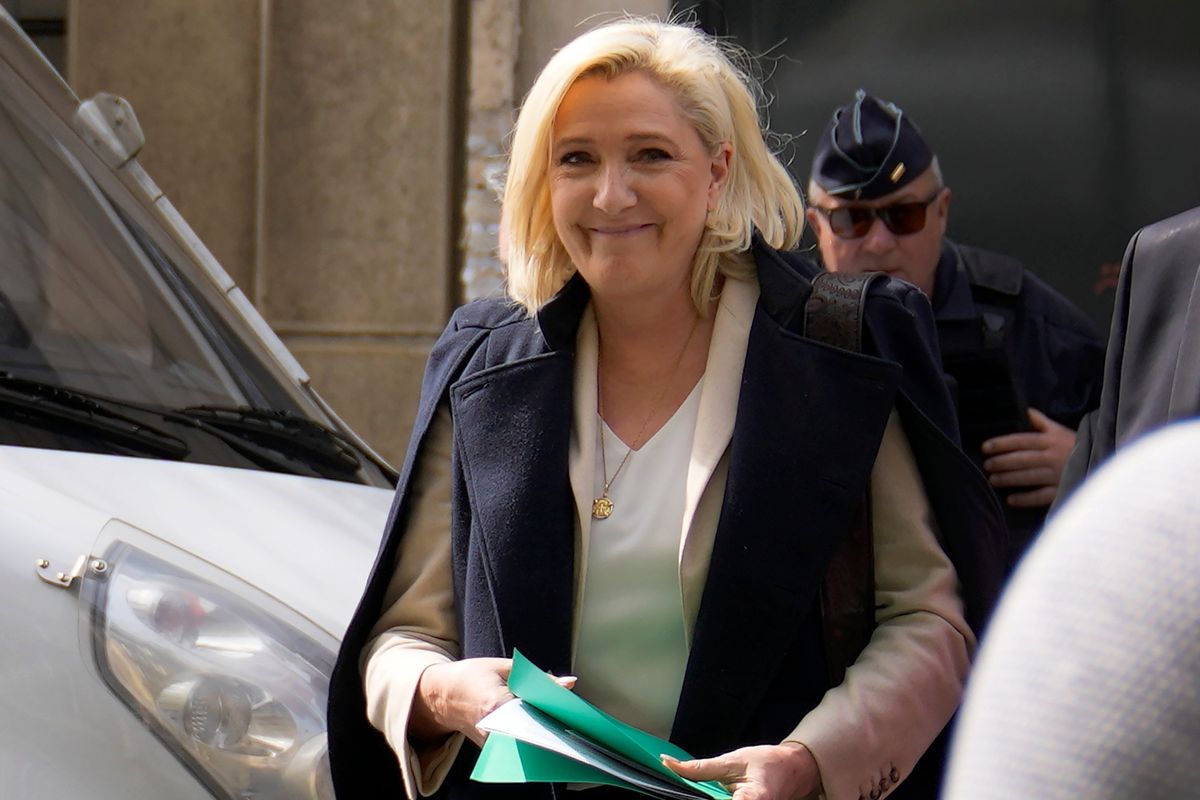Potential far-right victory in France seen as threat to EU

STRASBOURG, France — French President Emmanuel Macron and extreme-right politician Marine Le Pen voiced two radically opposed visions of Europe on Tuesday: one resolutely advocating for the bloc of 27 nations, the other defending her French nationalist mottos.
If Macron falters in France’s April 24 presidential runoff between the two, the far-right could be at the helm of the European Union, an abhorrent idea to most leaders in the bloc.
Experts say a win for Le Pen would have immense repercussions on the functioning of the EU. Not only would her coming to power damage the democratic values and commercial rules of the bloc, but it would also threaten the EU’s common front and sanctions in response to Russia’s war in Ukraine.
Macron headed on Tuesday to Strasbourg, the seat of the EU parliament, to speak about France’s role in Europe. All polls show he is the favorite in the runoff, but Le Pen has significantly narrowed the gap compared to when Macron handily won five years ago.
“Nationalism is war,” Macron warned in front of thousands of supporters waiving French and European flags.
At a time when “war is back on the European continent … it’s through Europe that we will build peace,” he said, welcoming a big Ukrainian flag being waived in front of the stage.
“Europe is a treasure we patiently built, but which will also allow us to respond to the challenges of the future,” he added.
The outdoor rally, near the city’s 12th-century cathedral, was closed by the French and the European anthems.
France has always stood at the heart of the EU — a founding member that has partnered with neighbor and historical rival Germany to turn the bloc into an economic giant and an icon of Western values. To hand that vaunted perch to a far-right politician would be bad enough. But, as coincidence would have it, France also holds the EU’s rotating six-month presidency this spring, which also allows it to speak with the power of the 27.
It is a pedestal few want to offer to Le Pen. The National Rally leader wants to establish national border controls on imports and people, reduce the French contribution to the EU budget and cease to recognize that European law has primacy over national law.
She has proposed removing taxes on hundreds of goods and wants to reduce taxes on fuel — which would go against the EU’s free market rules and efforts to fight climate change.
Although Le Pen has excised Frexit from her platform, her hostility toward the EU is still clear. Speaking to France Inter radio, Le Pen said Tuesday that “a large majority of French people no longer want the European Union as it exists today.” She accused the bloc of acting “in an absolutely anti-democratic way.”
She refuted critics’ charges that her policies would amount to a French exit from the EU. Instead, she said the EU can be changed “from within.”
Macron accused Le Pen of speaking “nonsense.”
“She explains that she won’t pay the bill for the (EU) club, that she will change the rules, but will change the rules alone” he said. “It means she wants to get out (of the EU) but doesn’t dare say it anymore.”
Jean-Claude Piris, who served as a legal counsel to the European Council, said a victory for Le Pen would have the effect of an “earthquake.”
“She is in favor of a form of economic patriotism with state aids, which is contrary to the rules of the single market,” Piris told The Associated Press.
“She wants to modify the French constitution by giving preference to the French, by suppressing the right of the soil, the right of asylum,” which would be “totally incompatible with the values of the European treaties,” Piris added.
Piris said Le Pen would also threaten the unanimity of the bloc’s 27 nations on the sanctions they have adopted so far against Russia for its invasion of Ukraine. She could prevent further measures being adopted. The bloc is currently mulling whether to add further restrictions on oil imports from Russia.
Le Pen has built close links with the Kremlin over the years. In her previous bid to become the French president in 2017, she called for strong security ties with Moscow to jointly combat radical Islamic groups. She also pledged to recognize Crimea — the peninsula Russia annexed from Ukraine in 2014 — as part of Russia.
Le Pen acknowledged Russia’s invasion of Ukraine has “partially” changed her views about Russian President Vladimir Putin, saying he was “wrong” and expressing her support for the Ukrainian people and refugees.
A report from the Center for European Reform highlighted how Le Pen could go down the same road as Hungarian Prime Minister Viktor Orban and his Polish counterpart Mateusz Morawiecki in throwing up roadblocks for Brussels wherever she can to further slow the EU’s already cumbersome decision-making.
“The difference is that France … is indispensable to the EU,” the report stressed, saying the consequences would be “political chaos.”
Macron made a similar parallel with Hungary, warning that the far-right Le Pen would do the same thing that he said is happening in Budapest: “methodically, gradually reducing and deteriorating rights.”
CER experts also believe that Le Pen’s policies would clash with the bloc’s climate goals. Le Pen is in favor of expanding nuclear and several non-governmental groups have warned that she would slow down the transition toward renewable energy.
On top of that, the traditional French-German tandem would be undermined, with German Socialist chancellor Olaf Scholz highly unlikely to reach any compromise with Le Pen.
Luxembourg’s long-serving foreign minister, Jean Asselborn, said Le Pen as French president “would put us on a totally different track in the essence of the European Union.”
“The French must prevent that,” he said.